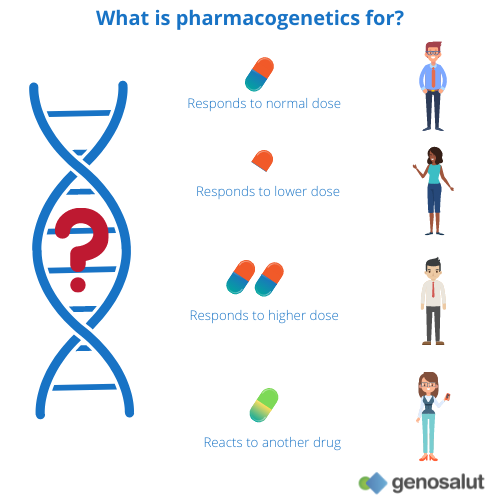What is pharmacogenetics or pharmacogenomics?
Pharmacogenetics, also known as pharmacogenomics, is the study of how a person’s genes affect the way they respond to medicines. In other words, research in the field of pharmacogenetics is aimed at revealing the actions and interactions between drugs and individuals based on their genes. In other words, they study the effect of an individual’s genetic variability in relation to their response to particular drugs.
Pharmacogenomics aims to optimise drug therapy, with respect to the genotype of patients, to ensure maximum efficacy with minimum adverse effects.
Pharmacogenetic tests: their importance
Thanks to this knowledge, pharmacogenetic tests can be used to know in advance what will be the best drug or dose for an individual.
Although diet, general health and environment also have a significant influence on the response to medication, none of these is as strong an indicator as an individual’s genetics. Thus, adverse reactions to certain drugs are related to some genetic polymorphisms in genes encoding key drug metabolising enzymes. Drugs such as beta-blockers, antiarrhythmics and antipsychotics are just a few examples of drugs whose metabolism may be altered by the presence of polymorphisms.
What genes do pharmacogenetic tests analyse?
Some of the groups of genes that are most frequently analysed in this type of genetic study are the CYP genes: CYP1, CYP2, CYP3 and CYP4. Why? Because the enzymes encoded by these genes are involved in the metabolism of the vast majority of the most common drugs.
Pharmacogenomics: the road to personalised and precision medicine
Among the main objectives of pharmacogenomics is to put an end, as far as possible, to the common clinical practice of “one drug, one dose fits all”. At the same time, it also aims to eliminate trial and error in prescribing, as knowledge of patients’ genetic information will allow doctors to assess the efficacy of different drugs (and sometimes provide an explanation for the failure of previous treatments).

Whether it is used to assess potential treatment, analyse a patient’s response or lack of response to a therapy, pharmacogenomics is expected to help achieve better treatment outcomes, improved efficacy and minimisation of the occurrence of toxicities and adverse drug reactions.
In short, the aim of pharmacogenetics and its diagnostic tests is to help physicians select the most appropriate drugs and doses for each individual. In other words, to help provide personalised therapy for each patient.
At Genosalut we have various pharmacogenetic tests for cancer drugs, antipsychotics, vascular disorders and other diseases.
If you like our blog, subscribe to our newsletter


